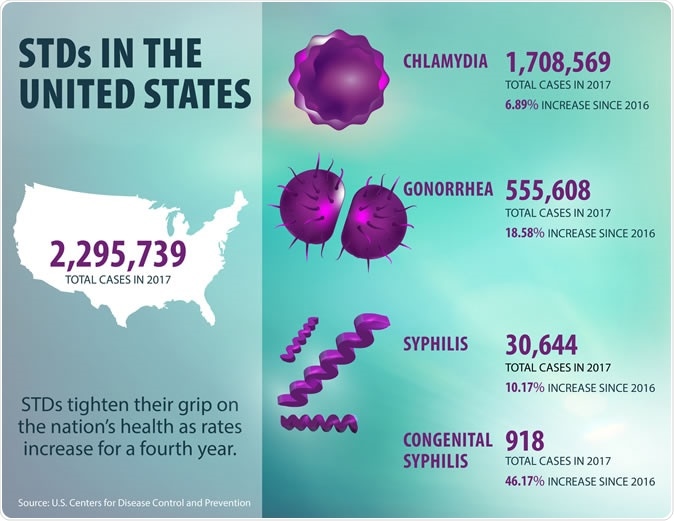Congenital syphilis or new born syphilis occurs in the new born baby when the mother is affected with the syphilis bacteria during pregnancy or delivery and passes it on to her baby. A new report that was released this Tuesday (25th September 2018) by the US Centres for Disease Control and Prevention (CDC) that showed that in the US, the numbers of these new born syphilis cases have doubled since 2013.
According to the CDC report, the infection is passed on to the baby in 80 percent of cases where the mother is infected. This can cause death or still birth in the baby in nearly 40 percent of the pregnancies. The report states that in 2013 the number of cases were 362 that jumped to 918 in 2017. Nearly 7 in 10 of these cases come from five states - Arizona, California, Florida, Louisiana and Texas. Louisiana leaded the rest with 93.4 cases for every 100,000 births. Western and Southern states are most commonly affected among the 32 states from where reports have emerged. The report says that this increase is much more than the sexually transmitted disease prevalence around the country.

The CDC report states that there is a 76 percent rise in primary and secondary syphilis between 2013 and 2017. Men are more affected with the infection with 88 percent of the infected being men in 2017. However, there is also a rise in cases among women with 1.9 cases among 100,000 women in 2016 and 2.3 cases per 100,000 women in 2017. With this rise among women there is also a rise in new born syphilis says the report. There have been 77 stillbirths due to syphilis in 2017 says the report.
The report adds that only one third of all women who gave birth to a baby with syphilis were tested for the infection during their ante natal check-ups. The report states that it could be that these mothers could have acquired the infection after the testing and did not get treated for the infection before delivery. Lack of treatment allowed the mother to pass on the infection to the baby during child birth, they explain.
Dr. Pablo J. Sanchez, a principal investigator in the Center for Perinatal Research at The Research Institute at Nationwide Children's Hospital and a professor of pediatrics at The Ohio State University College of Medicine in a statement said, “I am not surprised that congenital syphilis has increased because we have been seeing increasing cases of syphilis among women of child-bearing ages. So it's not surprising but it is of major concern.” He was not part of this report but added that newborn syphilis leads to not only stillbirth but also leads to enlarged spleen and liver, abnormal bone inflammation, rashes, brain and eye infections etc. He warned that most babies with congenital syphilis look normal at birth and this means screening and treating for syphilis during pregnancy is vital. He said that the detection may take place when the child is around 8 to 10 years.
The CDC recommendations state that all pregnant women should be screened early during the pregnancy so that treatment can be given and the stillbirth and congenital syphilis can be avoided. Screening should take place again at 28 to 32 weeks of pregnancy and at the time of delivery to avoid congenital syphilis say the recommendations. The mother is treated with antibiotics like Penicillin to initiate cure and prevent transmission.

David Harvey, executive director of the National Coalition of STD Directors said that this increase in congenital syphilis is a “systemic failure”. He said in a statement, “We are failing pregnant women in the United States. We are seeing almost 1,000 babies born with syphilis that can easily be prevented.”
Dr. Gail Bolan, director of CDC’s Division of STD Prevention in a statement said, “To protect every baby, we have to start by protecting every mother. Early testing and prompt treatment to cure any infections are critical first steps, but too many women are falling through the cracks of the system. If we're going to reverse the resurgence of congenital syphilis that has to change.”